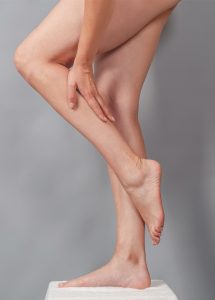 Varicose veins are swollen, twisted veins that often appear blue or purple, and can cause discomfort, pain, and cosmetic concerns. Varicose veins are caused by a malfunction in the valves of the veins. Veins are responsible for carrying blood back to the heart from the rest of the body. The veins in the legs have to work against gravity, which means that they have to rely on the contraction of the leg muscles to help push the blood back up to the heart. To prevent blood from flowing backward, veins have one-way valves that close after the blood has passed through them.
Varicose veins are swollen, twisted veins that often appear blue or purple, and can cause discomfort, pain, and cosmetic concerns. Varicose veins are caused by a malfunction in the valves of the veins. Veins are responsible for carrying blood back to the heart from the rest of the body. The veins in the legs have to work against gravity, which means that they have to rely on the contraction of the leg muscles to help push the blood back up to the heart. To prevent blood from flowing backward, veins have one-way valves that close after the blood has passed through them.
However, when these valves become weak or damaged, they cannot close properly, and blood begins to flow backward and pool in the veins. This causes the veins to become enlarged, twisted, and distorted, leading to the appearance of varicose veins.
Several factors can contribute to the development of varicose veins, including age, gender, family history, obesity, pregnancy, hormonal changes, and a sedentary lifestyle. As people age, the valves in their veins may weaken, making them more susceptible to varicose veins. Women are also more likely to develop varicose veins than men due to hormonal changes that occur during pregnancy, menstruation, and menopause. Obesity can increase the pressure on the veins, making it more difficult for the valves to function correctly. Finally, a sedentary lifestyle can also contribute to the development of varicose veins, as it leads to poor circulation and weak leg muscles.
While varicose veins are not always a serious medical condition, they can cause discomfort, pain, and cosmetic concerns. It’s important to consult a healthcare provider if you experience any symptoms of varicose veins, such as swelling, pain, or itching. A healthcare provider can recommend the best treatment plan based on the severity of the condition and the patient’s overall health.
The best treatment plan for varicose veins depends on the severity of the condition, the patient’s age and health, and their personal preferences. Here are some common treatment options for varicose veins:
1. Lifestyle changes: Making some simple lifestyle changes can help prevent varicose veins from getting worse or recurring. These include regular exercise, maintaining a healthy weight, avoiding prolonged standing or sitting, and wearing compression stockings.
2. Sclerotherapy: This is a minimally invasive procedure that involves injecting a solution into the affected veins to cause them to collapse and eventually fade away. Sclerotherapy is effective for smaller veins but may require multiple treatments.
3. Endovenous laser treatment (EVLT): This procedure involves using a laser to heat and seal off the affected vein. EVLT is effective for larger veins and is typically done on an outpatient basis.
4. Radiofrequency ablation: This is a similar procedure to EVLT, but it uses radiofrequency energy to heat and seal off the affected vein.
5. Surgery: In severe cases, surgery may be necessary to remove the affected veins. This is typically done as a last resort when other treatments have failed.
To prevent varicose veins from recurring, it’s essential to maintain a healthy lifestyle, wear compression stockings as prescribed, and follow your doctor’s instructions after treatment. Regular exercise, avoiding prolonged standing or sitting, and maintaining a healthy weight are crucial to preventing the development of new varicose veins. It’s also important to manage any underlying medical conditions that can contribute to the development of varicose veins, such as high blood pressure or diabetes.
In conclusion, the best treatment plan for varicose veins depends on the severity of the condition and the patient’s personal preferences. Lifestyle changes, sclerotherapy, endovenous laser treatment, radiofrequency ablation, and surgery are all viable options for treating varicose veins. To prevent varicose veins from recurring, it’s important to maintain a healthy lifestyle, wear compression stockings, and follow your doctor’s instructions after treatment.
The Vascular and Vein Center at Gulfcoast Surgeons is one of the first and most respected vein clinics in Southwest Florida. Our surgeons, Dr. Abraham Sadighi and Dr. Johan Escribano have performed thousands of vascular and vein surgeries over the past 28 years. We focus on diseases of the vascular system that can range from harmless but unattractive spider veins to dangerous conditions such as peripheral artery disease. Our caring and dedicated team will help you identify problems and offer the best treatment options for you at any of our three locations.
Vascular and Vein Center at Gulfcoast Surgeons
877-LEG-PAIN
gulfcoastsurgeons.com
Fort Myers
8010 Summerlin Lakes Dr., Ste. 100
Fort Myers, FL 33907
Cape Coral
1003 Del Prado Blvd., Ste. 303
Cape Coral, FL 33990
Bonita Springs
24301 Walden Center Dr., Ste. 102
Bonita Springs, FL 34134










